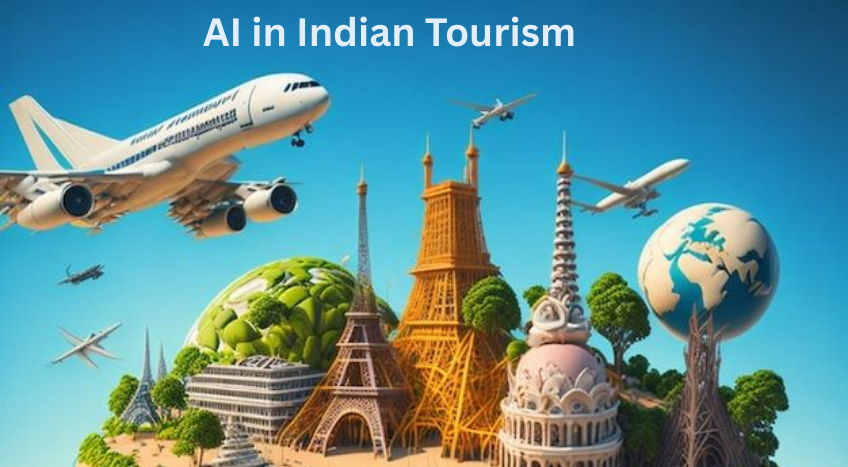
- 1. AI-Powered Personalized Travel Planning in India – A New Era of Exploration
- 2. AI in Indian Tourism Industry – A Growing Force
- 3. Artificial Intelligence in Indian Tourism – Real Examples
- 4. AI-Based Hotel and Flight Recommendations – Smarter Bookings
- 5. Smart Travel Assistants for Indian Travelers – Always On, Always Ready
- 6. AI Tour Guide – Your Digital Companion
- 7. AR and AI Heritage Tours in India – Bringing the Past to Life
- 8. Travel Recommendations Powered by AI – Tailored Journeys
- 9. Digital Tourism – A Post-Pandemic Necessity
India is one of the most diverse travel destinations in the world—home to the snow-clad Himalayas, golden deserts, lush rainforests, and centuries-old heritage sites. As tourism continues to evolve in the digital age, the AI in Indian tourism industry is emerging as a key driver of personalized and efficient travel experiences.
From helping a solo traveler plan the perfect Rajasthan itinerary to offering real-time translation for foreign visitors in Kerala, AI-powered personalized travel planning in India is redefining the way people explore the country.
In this blog, we’ll explore how AI is powering smart travel, personalized recommendations, AI-driven tour guides, AR-based heritage tours, and more—while highlighting how both startups and government bodies are leveraging these innovations
1. AI-Powered Personalized Travel Planning in India – A New Era of Exploration
The rise of AI-powered personalized travel planning in India means travelers no longer need to spend hours researching destinations, hotels, and activities. Instead, AI algorithms curate customized itineraries based on a traveler’s interests, budget, and time frame.
How it works:
- AI gathers data from search history, booking patterns, and travel preferences.
- It analyzes millions of data points from other travelers’ experiences.
- It creates a personalized day-by-day plan with accommodation, dining, and sightseeing suggestions.
For example, an AI travel platform can suggest a smart travel plan for a family visiting Goa that balances beach relaxation, heritage exploration, and adventure sports—optimized for their travel dates and budget.
By integrating AI into trip planning, companies are making travel more efficient, affordable, and memorable.
2. AI in Indian Tourism Industry – A Growing Force
The AI in Indian tourism industry is not just a trend; it’s a growing ecosystem of startups, established travel agencies, and government tourism boards embracing AI for operational efficiency and customer delight.
Key areas where AI is making an impact:
- Dynamic Pricing – Hotels and airlines use AI to adjust prices based on demand and season.
- Automated Customer Service – AI chatbots assist travelers with queries 24/7.
- Predictive Demand Forecasting – Helps tourism boards prepare for peak seasons.
States like Kerala and Rajasthan are integrating AI with digital tourism campaigns, ensuring tourists get relevant suggestions and real-time travel assistance.
3. Artificial Intelligence in Indian Tourism – Real Examples
When we talk about artificial intelligence in Indian tourism, it’s not just about futuristic concepts—it’s already happening.
Examples include:
- OYO Rooms – Uses AI for AI-based hotel and flight recommendations based on traveler preferences and booking history.
- MakeMyTrip – AI-driven chat assistants for booking and support.
- Indian Railways – AI predicts ticket demand and optimizes seat allocation.
These tools improve efficiency for businesses while making travel planning seamless for users.
4. AI-Based Hotel and Flight Recommendations – Smarter Bookings
One of the most sought-after applications of AI is AI-based hotel and flight recommendations. Instead of generic search results, AI suggests the most relevant options based on:
- Location preferences.
- Past booking patterns.
- Price sensitivity.
- Loyalty program memberships.
For example, a business traveler visiting Delhi frequently will receive hotel options close to meeting venues, while a honeymoon couple heading to Manali might see romantic boutique stays.
This level of personalization increases booking satisfaction and helps travelers make quicker decisions.
5. Smart Travel Assistants for Indian Travelers – Always On, Always Ready
From Siri to Alexa to specialized travel bots, smart travel assistants for Indian travelers are changing the way people explore destinations.
Capabilities include:
- Answering real-time questions about transport, weather, and local attractions.
- Translating conversations instantly for foreign tourists.
- Suggesting nearby restaurants and activities based on location.
For instance, a tourist in Varanasi could use a smart travel assistant to find the best ghat for the evening Ganga Aarti while also receiving safety tips and historical background.
6. AI Tour Guide – Your Digital Companion
The AI tour guide is a step ahead of traditional human-guided tours. It delivers location-based storytelling, multimedia content, and navigation help through a smartphone or wearable device.
Advantages:
- Multi-language support for international visitors.
- Customizable depth of information depending on interest levels.
- AR integration for enhanced visuals.
Imagine visiting the Ajanta Caves and having an AI tour guide overlay historical reconstructions on the walls through augmented reality, making history come alive.
7. AR and AI Heritage Tours in India – Bringing the Past to Life
AR and AI heritage tours in India are revolutionizing how travelers experience monuments and historical sites. Using a smartphone or AR glasses, tourists can:
- See ancient ruins in their original form.
- Interact with AI-powered virtual historians.
- Access personalized trivia and stories.
For example, the Taj Mahal could be experienced not just as a monument but through a guided AI-AR experience detailing its construction, cultural significance, and lesser-known tales.
8. Travel Recommendations Powered by AI – Tailored Journeys
AI-driven travel recommendations take into account:
- Seasonal trends.
- Current events.
- User interests (nature, adventure, culture, wellness).
This ensures travelers get relevant suggestions every time—whether it’s recommending Ladakh in summer for adventure lovers or Rishikesh in winter for spiritual retreats.
By combining real-time analytics with user profiling, AI-powered personalized travel planning in India becomes more precise with each trip a traveler takes.
9. Digital Tourism – A Post-Pandemic Necessity
The pandemic accelerated digital tourism adoption in India. With AI’s help, virtual tours, contactless check-ins, and predictive safety alerts have become mainstream.
Key benefits:
- Reduced human contact in bookings and check-ins.
- Virtual exploration of destinations before travel.
- AI-driven updates on local COVID or weather conditions.
For example, several Indian heritage sites now offer AI-assisted VR tours for travelers who can’t visit physically.
10. Startups and Government Collaboration in AI-Powered Tourism
Indian tourism startups like ScoutMyTrip, PickYourTrail, and Thrillophilia are leading innovations in AI-powered personalized travel planning in India. Meanwhile, government bodies are integrating AI for visitor management, especially in high-footfall areas like Jaipur’s Amer Fort or Kerala’s backwaters.
These partnerships ensure that technology benefits both large-scale tourism hubs and lesser-known rural destinations.
11. Challenges in AI in Indian Tourism Industry
While AI offers immense potential, the AI in Indian tourism industry faces challenges:
- Digital Divide – Not all regions have internet connectivity for AI services.
- Data Privacy – Protecting traveler information is critical.
- Skill Gap – Training tourism professionals to use AI tools effectively.
Overcoming these will be crucial for the industry’s sustainable growth.
12. The Future – AI as the Core of Travel Experiences
Looking ahead, AI-powered personalized travel planning in India will only become more intuitive. Expect:
- AI predicting mood-based travel preferences.
- Smart travel assistants integrating health, finance, and safety features.
- Heritage tours with holographic AI storytellers.
At AixCircle, we believe artificial intelligence in Indian tourism will be the backbone of travel experiences—making journeys smoother, safer, and more immersive. From AI-based hotel and flight recommendations to AR and AI heritage tours in India, the future of tourism will blend tradition with technology like never before.

